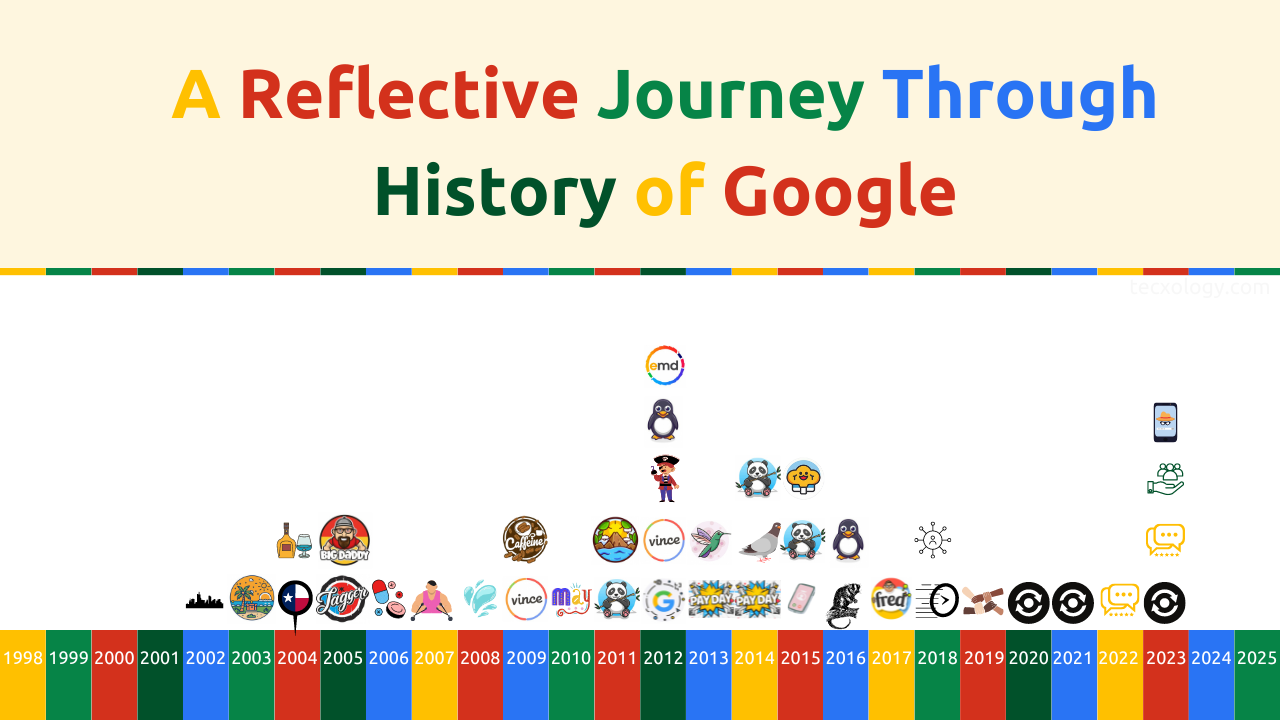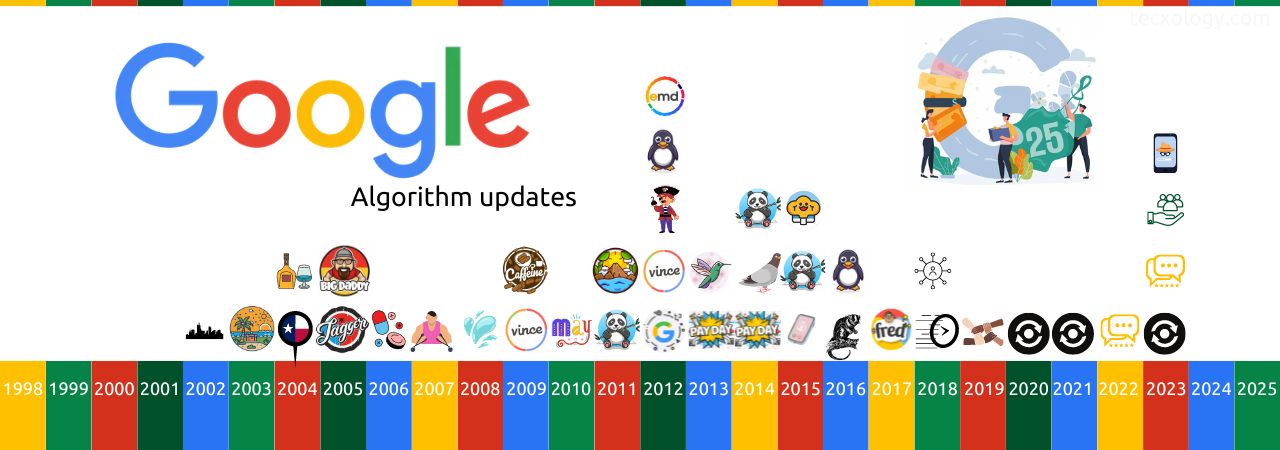
Newsletter Subscribe
Enter your email address below and subscribe to our newsletter

The latest technology updates & more!

1998! This was the year when the digital landscape was just beginning to take shape, and two Stanford University students, Larry Page and Sergey Brin, were about to change the game forever. Want to know more about this inspiring journey? Buckle up and read on about Google in 1998.
Table of Contents

Larry Page and Sergey Brin huddled in their Stanford dorm rooms, fueled by caffeine and a relentless passion for innovation. It was here that they conceived the idea of a revolutionary search engine, initially dubbed “BackRub”, a research project that was begun in 1996 when Larry and Sergey were PhD candidates at Stanford University in Stanford, California. The concept was simple yet groundbreaking: analyze the web’s interconnectedness to determine the relevance and importance of individual pages.
BackRub stood out for using a novel method to rank websites. It examined the quantity and calibre of links referring to a page rather than only its content. Said another way, the focus was entirely on determining how interconnected the web is. Sergey and Larry had no idea that BackRub was simply the start of something much larger.
10100 = 10,000,000,000,000,000,000,000,000,000,000,000,000,000,000,000,000,000,000,000,000,000,000,000,000,000,000,000,000,000,000,000,000,000
BackRub underwent a transformation like no other. Larry and Sergey rebranded their brainchild as “Google,” a playful nod to the mathematical term “googol“, representing the number 1 followed by 100 zeros. Thus, they take the word “googol”, give it a fun spin, and voilà—Google is created. Yes, it’s a little out of the ordinary, but then, so are they. They had no idea that they were going to produce a cultural icon that would influence how we use the internet going forward.

September 1998 was a time of great excitement on the internet. Larry Page and Sergey Brin are getting ready to establish Google, a groundbreaking new search engine. It’s been months, maybe years, in the making, and there’s a tangible sense of expectation. At last, the day comes. September 4, 1998. Google.com launches with a few mouse clicks, introducing a new method of web searching to the world. The days of awkward user interfaces and meaningless outcomes are long gone. Google is shockingly accurate, quick, and stylish. And with it, a significant accomplishment is made.

Ah, the internet’s wild west, sometime in the late 1990s. You had to figure out the Google code back then if you wanted people to see your website. The problem is that nobody understood what that code meant. Now for search engine optimization or SEO. Equipped with keywords, meta tags, and link-building tactics, webmasters and marketers ventured forth into this uncharted territory in the realm of digital marketing. The objective was uncomplicated: rise in Google’s search results and enjoy the benefits of natural traffic. But it’s easier said than done. There was mystery surrounding Google’s algorithm, and deciphering it was no easy task.
Also Read: Characteristics of IoT (Internet of Things)

Webmasters picked up the skill of “keyword stuffing” fast, adding as many keywords as they could to their material. Webmasters began stuffing their code with keywords in meta tags as the holy grail of SEO, hoping to attract Google’s attention. Not to be overlooked is connection building. Back then, quantity always won out over quality. Webmasters frequently exchanged links in order to boost their site’s authority in Google’s eyes.
Alright, let’s speak about late 1990s internet advertising. To be true, it was a little bit of a chaos. Every webpage was overloaded with banner adverts, unexpected pop-ups appeared, and let’s not even talk about those annoying “You’ve Won!” ads that flashed. Then Google AdWords appeared, a glimmer of optimism in a deluge of digital noise. Advertisers now have an efficient and accurate method of reaching their intended demographic with AdWords.

Advertisers would place bids on keywords associated with their goods or services. This is how it operated. Their advertisement would be the first one to show up in Google’s search results when someone searches for one of those terms. It resembled magic. The best thing, though, is that marketers only get paid when a user clicks on their advertisement. Thus, “pay-per-click” advertising got its moniker. Offering advertisers, a quantifiable and economical means of increasing traffic and conversions, it was a game-changer. And with that, the online advertising era was irrevocably altered. Google AdWords, thank you!
Also Read: How to debloat Windows 11 From Junk Apps (Best Method)

Rewind to the late 1990s, when content reigned supreme, and the internet resembled the American West. The need for high-quality material increased dramatically with the rise of Google. All of a sudden, and understandably so, everyone was trying to produce material that would place highly in Google search results. Google was insatiably hungry for new, pertinent material. The more material you produced, the more popular you were on Google. A union made in digital heaven, as it were.

The internet become a little bit richer, a little bit more educational, and a little bit more linked with each blog post, article, and video. Google devoured anything as long as it was useful and instructive for people. The truth is, though, that producing content wasn’t solely done to please Google. It was all about holding your audience’s attention and proving to be a reliable authority in your field. Ultimately, while Google acted as the guardian of the internet, the secret to success was your audience. Thus, the development of content became essential to Google’s expansion.
Now let’s discuss Google’s algorithms. You know, those enigmatic algorithms that decide which web pages show up first in the search results? Yes, those particular ones. Google’s algorithm was a mystery in the late 1990s. Although nobody was truly sure how it operated, everyone was attempting to figure it out. And Google would throw you a curveball just when you thought you had everything figured out.

Here are three of the most notable algorithm changes in Google history: Panda, Penguin, and Hummingbird. The SEO community was rocked by these changes, and webmasters were forced to change or risk falling behind.
| Year | Algorithm Update | Key Focus |
|---|---|---|
| 1998 | BackRub (original algorithm) | Analyzed backlinks to determine webpage importance |
| 1999 | PageRank | Refined BackRub, assigning weights to backlinks based on source importance |
| 2000 | Google Toolbar PageRank | Introduced PageRank scores to the public through a browser toolbar |
| 2003 | Florida Update | Targeted link schemes and excessive keyword stuffing |
| 2004 | Florida Update 2 | Further addressed link manipulation and keyword stuffing |
| 2005 | Brandy Update | Focused on improving search results for complex or ambiguous queries |
| 2006 | Jagger Update | Targeted low-quality content and doorway pages |
| 2007 | Caffeine Update | Improved the indexing and ranking of fresh content |
| 2009 | Vince Update | Enhanced the handling of synonyms and related searches |
| 2010 | Panda Update | Targeted low-quality content farms and thin content |
| 2011 | Google Instant | Introduced real-time search suggestions as users type |
| 2011 | Panda Update 2.0 | Further refined the Panda algorithm to target broader content quality issues |
| 2012 | Penguin Update | Targeted websites engaging in webspam tactics like link buying and keyword stuffing |
| 2013 | Hummingbird Update | Focused on understanding the semantic meaning of search queries and user intent |
| 2014 | Panda Update 3.0 | Continued improvements to content quality assessment |
| 2015 | RankBrain Update | Introduced machine learning to personalize search results and understand complex queries |
| 2016 | Penguin Update 4.0 | Integrated Penguin algorithm into core ranking system |
| 2017 | Fred Update | Targeted websites with low-quality content and aggressive advertising |
| 2018 | Medic Update | Focused on improving the quality of search results for health-related queries |
| 2019 | BERT Update | Further enhanced understanding of search queries using natural language processing |
| 2019 | BERT Update 2.0 | Extended BERT’s capabilities to handle more complex and nuanced queries |
| 2020 | Featured Snippets Update | Refined the selection process for featured snippets displayed on search results pages |
The SEO community was awakened by these improvements. You could no longer manipulate the system with keyword stuffing or dubious link-building strategies. You had to follow Google’s guidelines if you wanted to appear highly in its search results, or else you risked the risk of falling behind.
Also Read: Add Me To Search, Add Yourself to Google Search & Google’s People Card
Now, let’s go ahead and jump to the present—or is it better to say the future? One thing is certain as we peer into the crystal ball of the digital landscape: exciting times are coming for Google and SEO. Search engines are getting smarter than ever thanks to developments in artificial intelligence, machine learning, and natural language processing. The speed at which Google’s algorithm is developing means that it is continuously improving its capacity to discern user intent and provide tailored search experiences. What does this imply for SEO, then?

However, that’s precisely why SEO is so fascinating, isn’t it?

Let’s pause to consider the legacy of 1998—the year that saw the creation of Google and fundamentally altered the digital world. The internet was full of confusion and mayhem back then, much like the untamed West. Google altered everything. It helped people locate the information they were looking for by bringing order to the chaos. Moreover, Google’s influence extends beyond search. It has completely changed the way we interact with one another, conduct business, and get around. Google has shaped our daily lives and the way we engage with technology and each other.
1998 will always be remembered as a turning point in the history of the internet since it was the year that Google was founded, and a new era of digital discovery began. Leading the way at Google, we started a journey that is still running strong today and paving the way for further innovations. As we look at this significant event, let’s virtually applaud the pioneers like Larry and Sergey, whose spirit of innovation transformed the way we engage with the modern world. Cheers to Google’s 1998 founding and all the unbounded possibilities it will continue to open up!
Google tucks away a unique feature as a playful Easter egg! You can travel back in time by searching for “Google in 1998” and see an exact duplicate of the first search engine interface. You can take a nostalgic look back at Google’s early years, peruse the basic design, and investigate early search results.
There are several pieces of evidence.
Historical data: Press reports and corporate announcements confirm Google’s establishment in 1998, and public sources validate this date as well.
Company details: On its main website and other channels, Google acknowledges its establishment in 1998.
Academic papers: The early development of Google is described in depth in Page and Brin’s 1998 research paper, “The Anatomy of a Large-Scale Hypertextual Web Search Engine.“
The Google search engine was created by Stanford University doctoral students Larry Page and Sergey Brin.
Indeed, Google is a multinational technology company that is presently an Alphabet Inc. subsidiary. Although it began as a search engine, it has since grown to provide a wide range of goods and services.
Larry Page And Sergey Brin thought they could develop a more efficient method of accessing and organizing web content as they were dissatisfied with the shortcomings of the search engines that were already in place. “Organize the world’s information and make it universally accessible and useful” was their stated mission.